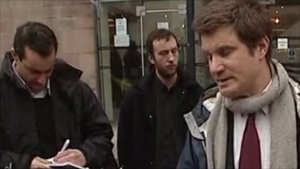
Mike Schwarz of Bindmans, solicitor for the defendants, made several statements in the immediate aftermath of the collapse of the ‘deniers’ trial in January 2010. The first was on Bindman’s website.[1]Mike Schwarz, Bindmans comments on collapse of prosecution against 6 environmental campaigners at Nottingham Crown Court today, Bindmans LLP, 10 January 2011 (accessed 20 August 2016). The second was read out to press outside Nottingham Crown Court on 10 January. Both are reproduced below.[2]Copy of text provided by Alan ‘Tash’ Lodge, a photojournalist present on the day.
Bindman’s comments on collapse of prosecution against 6 environmental campaigners at Nottingham Crown Court today.
Statement from Mike Schwarz about Ratcliffe power station protesters
“On Easter Monday 2009, over 400 police officers were involved in a raid at Iona School in Nottingham, which led to 114 arrests. I represented 113 of those arrested.
The 114th we now know was PC Kennedy, an undercover police officer. Six of my clients were due to face a long trial starting today. However, the prosecution told the defence on Friday 7 January 2011, just before the trial was due to begin, and almost 20 months after the investigation began, that ‘previously unavailable material that significantly undermines the prosecution’s case came to light on Wednesday 5 January’.
The discovery of this material came at the time when the prosecution were informed that we planned to pursue disclosure of the evidence relating to PC Kennedy with the judge.
Unsurprisingly, they have declined to confirm whether the new material relates to PC Kennedy.
In my opinion the two are obviously connected. The timing speaks for itself. These events also beg wider, serious questions. Would this evidence have been uncovered had the defence not become aware of it through other avenues? And is it appropriate that access to, and decisions about, disclosure of key evidence should exclusively be in the hands of a prosecution whose primary function is to secure convictions?
Let me be clear about this. My clients were not guilty. They did not agree to join in any plan to occupy the power station. The evidence of PC Kennedy presumably confirmed this. Yet that evidence, had it been kept secret, could have led to a miscarriage of justice.
Serious questions must be asked relating to the policing of protest, from the use of undercover officers, to the use of expensive and legally questionable mass pre-emptive arrest of protesters, to the use of stringent and unaccountable pre-charge police bail conditions, to the seemingly arbitrary nature by which the 114 initially arrested were reduced to the final 26 who were eventually charged. The police need to answer some serious questions about their conduct relating to protesters.”
2. Statement from Mike Schwarz, Lawyer to the Defendants
(As provided to journalists on 10 January 2010.)
I make this statement (in addition to the two statements on the Bindmans’ website) in response to revelations in today’s media that the police recorded but have withheld from the defence covert recordings of a meeting or meetings of campaigners at which PC Kennedy was present; and also that PC Kennedy had approached Max Clifford with a view to selling his story to the newspapers.
I have a number of concerns and comments.
First, there is the process. This is an entirely unsatisfactory way for information about PC Kennedy’s undercover operations to come out. The police and Crown generally should have disclosed all this material to the defence and / or the Crown Court judges who dealt with the trials of the acquitted 6 or the convicted 20 before their cases came to trial. Specifically, so far as PC Kennedy’s apparent contact with Mr Clifford is concerned, any information from or about PC Kennedy should be disclosure direct and formally to those affected, the defendants in particular. PC Kennedy can, for example, provide the defence and prosecution teams with a statement. Anything short of this would amount to disclosure by tabloid.
Second, there is the content. It reinforces me in my view that the role of PC Kennedy in the planning of the action at Ratcliffe power station is as central to the safety of the convictions of the 20 as it was decisive in causing the collapse of the trial of the 6.
Third, there is the way ahead. I do not think that a referral to the IPCC [Independent Police Complaints Authority], as confirmed by the IPCC yesterday, is sufficient either to get to the bottom of what has happened, or investigate reports of more widespread police failings. The IPCC have, for example, limited themselves to the issue of police disclosure in the Ratcliffe trials.
An inquiry by Her Majesty’s Inspectorate of Constabulary, which has also been mentioned in the press, is and will be seen to be an exercise in the police investigating the police. A far wider, more powerful, independent enquiry is required – a judge-led enquiry for which the Macpherson inquiry into the Stephen Lawrence murder provides an off the shelf model, looking as it did at both the specifics of the case and the wider concerns about policing and race.
What has so far emerged of the PC Kennedy episode highlights similar concerns about the police’s conduct of the Ratcliffe case. It also raises wider concerns about the use of undercover police, particularly their use against those exercising democratic rights of protest and expression; as well as concerns about the policing of protests generally, the police services’ policies and their accountability.
Mike Schwarz
Solicitor for the acquitted 6 and the convicted 20 Ratcliffe environmental campaigners
References
| ↑1 | Mike Schwarz, Bindmans comments on collapse of prosecution against 6 environmental campaigners at Nottingham Crown Court today, Bindmans LLP, 10 January 2011 (accessed 20 August 2016). |
|---|---|
| ↑2 | Copy of text provided by Alan ‘Tash’ Lodge, a photojournalist present on the day. |